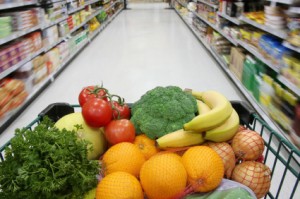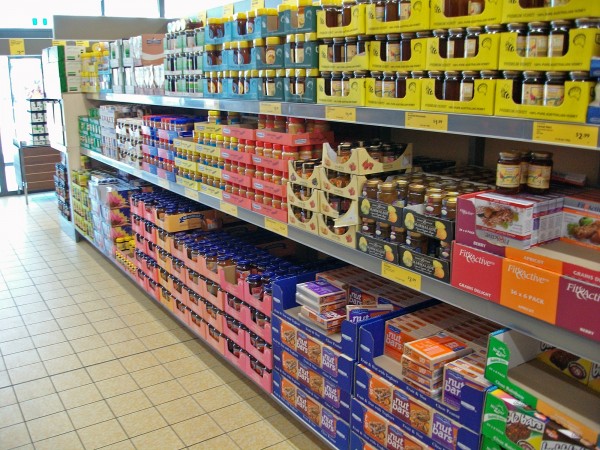It’s a common stereotype that when tertiary students leave home, the sudden rise in the cost of living means all independent young people can afford to eat is two-minute noodles.
Paying for rent, petrol, school supplies, and a social life can seem more important than budgeting for a decent meal.
However, eating right and living life doesn’t need to be an either/or situation. There are simple ways students, and anyone else who’s strapped for cash, can tweak their shopping habits and diet to keep their hard-earned money in their pockets.
Obviously everybody eats differently. Often gluten-free and vegan eaters must pay more to get products suited to their needs. Others have a high-protein or low-carbohydrate diet. The money-saving mindset, though, can always be applied to any diet when shopping for and preparing food.
 The time of week and day you visit the supermarket can affect how much you pay for groceries. Fresh produce like meat and bakery items usually get marked down at the end of the day to clear stock before new products hit the shelves the next morning. Shopping in the evening is a good way to get the same product you would have bought earlier that day for a few dollars less.
The time of week and day you visit the supermarket can affect how much you pay for groceries. Fresh produce like meat and bakery items usually get marked down at the end of the day to clear stock before new products hit the shelves the next morning. Shopping in the evening is a good way to get the same product you would have bought earlier that day for a few dollars less.
When it comes to fruit and vegetables, whatever is in season will be cheaper than produce grocers need to ship from elsewhere. A good example of this is berries, which are at the best price in Australia during the warmer months of the year.
Another trick to use at the supermarket is to check the real value of the products you’re buying. Don’t be enticed by the brightly coloured specials tickets. If you read the finer print under the price, you’ll see a value ‘per 100g’. This is a good way to compare the price of products that are different weights.
For example, if a little jar of peanut butter is 25% off, it may still be more expensive per 100g than a full-priced, larger jar. In this case it’s better for your wallet to buy the bigger jar if you’re going to use it anyway. Also know what day your local store’s specials start and check the weekly catalogues either in-store or online.
 Once you’ve got your groceries home, be open to new combinations in an effort to use what you buy and what you already have. Sometimes we shop unnecessarily because looking in our pantry or fridge give that same feeling of looking into a full wardrobes and having “nothing to wear”. Ignoring what you already have until it has gone bad is like eating half your chicken nuggets, then buying a hamburger and only eating half of that. Eat what you’ve already paid for before dishing out for something else.
Once you’ve got your groceries home, be open to new combinations in an effort to use what you buy and what you already have. Sometimes we shop unnecessarily because looking in our pantry or fridge give that same feeling of looking into a full wardrobes and having “nothing to wear”. Ignoring what you already have until it has gone bad is like eating half your chicken nuggets, then buying a hamburger and only eating half of that. Eat what you’ve already paid for before dishing out for something else.
There are a number of ways to use leftovers to make something new and exciting for dinner or lunch. A stir-fry is a good way to use fresh vegies before they go slimy. Using sauces and things you’ve already got in your cupboard can make a boring stir-fry taste restaurant-quality. Combine chilli sauce and crunchy peanut butter in a hot pan to make an easy Asian-influenced stir-through sauce. Soy sauce, honey and crushed garlic, fresh or from a jar, is a good flavour combination too if spicy flavours are not your taste.
If you have small amounts of cold meat or anti-pasta lying around –think olives, sun-dried tomatoes, mushrooms – you can whip up a frittata with some eggs, milk, cream and cheese. Lay all your bits and pieces in a casserole dish, cover with egg mixture and cheese, and bake in the oven. This is also good for lunch the next day.
Sometimes buying one extra product in order to use leftovers you have is a better solution to starting from scratch. Pasta is easy to make and will go with just about any meat or vegetable you have in the fridge, so buying a jar of basic pasta sauce is a good way to bring it all together. Plus, there will usually be enough sauce for a second meal as well. Pita bread and tomato paste make cheap pizza bases, ready to be topped with whatever you have on hand.
You don’t necessarily need to be savvy to save money in the supermarket or your kitchen, just sensible. Know how much you’re paying, use what you’ve got and keep your eyes out for genuine savings.
Rikki-Lee Burley is a second-year Bachelor of Journalism student at La Trobe University. You can read more of her work on her blog and follow her on Twitter: @RikkiLeeBurley.








